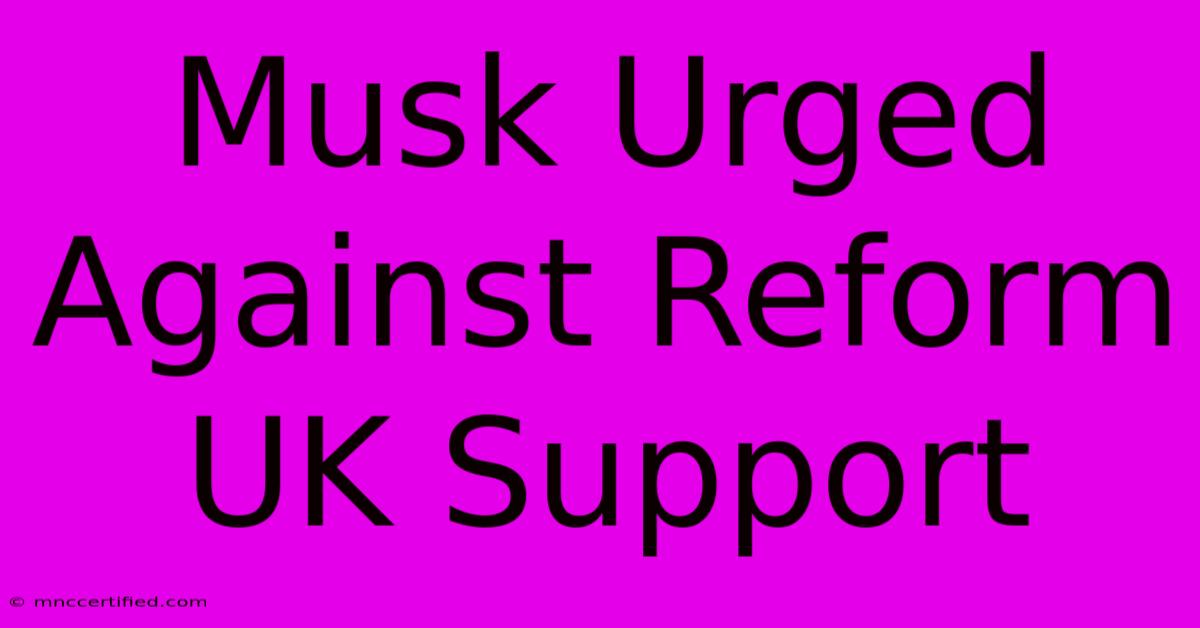Musk Urged Against Reform UK Support

Table of Contents
Musk Urged Against Reform UK Support: A Controversial Endorsement Avoided
Elon Musk's influence transcends electric vehicles and space exploration. His opinions carry significant weight, making any perceived endorsement a major talking point. Recently, speculation arose regarding potential support for Reform UK, a political party in the United Kingdom. However, strong urging against such an association quickly followed, highlighting the complexities of celebrity endorsements in the political arena. This article delves into the details of this situation, exploring the potential impact and the reasons behind the advice against supporting Reform UK.
The Rumor Mill: Musk and Reform UK
Rumors of a potential endorsement of Reform UK by Elon Musk sparked considerable debate. While no official statement confirming support ever emerged from Musk himself, the mere suggestion ignited a firestorm of discussion across social media and news outlets. The potential for such an endorsement was significant, given Musk's massive online following and his outspoken nature on various political issues. Reform UK, a party known for its populist stances and Brexit-focused agenda, would have undoubtedly benefited from the association. The perceived alignment, or lack thereof, between Musk’s business philosophies and Reform UK's policies added another layer of intrigue.
Analyzing the Potential Fallout
Had Musk explicitly supported Reform UK, the consequences could have been far-reaching. For Musk, it would have meant alienating a significant portion of his international fanbase who hold opposing political views. His business interests, particularly Tesla's operations in the UK, could also have suffered, as public opinion could have turned against the company. For Reform UK, the endorsement, while potentially beneficial in terms of increased visibility, could also have been a double-edged sword. The association with a controversial figure like Musk might have driven away some potential voters while attracting others. The unpredictable nature of public perception made the potential outcome difficult to predict.
The Urging Against Support: A Strategic Retreat?
The advice against supporting Reform UK, whether from advisors or stemming from Musk’s own reassessment, suggests a strategic recalculation. The potential downsides of openly endorsing the party likely outweighed any perceived benefits. This highlights the careful consideration required when high-profile figures consider involvement in partisan politics. Maintaining a neutral stance, while potentially limiting immediate political gains, often proves to be a safer and more sustainable strategy in the long run for business leaders.
Maintaining Brand Neutrality: A Key Strategy
For brands with a global reach like Tesla, maintaining political neutrality is crucial. Openly endorsing a specific political party, especially one as divisive as Reform UK, risks alienating a significant portion of the customer base. This could translate into lost sales, negative publicity, and damage to the brand's reputation. The urging against support demonstrates a commitment to preserving brand integrity and avoiding potentially damaging political entanglements.
Conclusion: The Importance of Calculated Engagement
The Musk-Reform UK situation serves as a compelling case study in the complexities of celebrity endorsements in politics. The advice against supporting the party underscores the importance of careful consideration, strategic planning, and a nuanced understanding of the potential consequences before taking a public stance on political matters. For high-profile individuals and companies, maintaining a balance between expressing opinions and preserving brand neutrality remains a delicate tightrope walk. This event emphasizes the need for calculated engagement in the political sphere, where the perceived benefits must be carefully weighed against the potential risks. The episode also raises questions about the role of influence in modern politics and the responsibilities of public figures in navigating the increasingly blurred lines between business and political advocacy.

Thank you for visiting our website wich cover about Musk Urged Against Reform UK Support. We hope the information provided has been useful to you. Feel free to contact us if you have any questions or need further assistance. See you next time and dont miss to bookmark.
Featured Posts
-
Kamaka Air Crash 2 Dead Near Honolulu
Dec 19, 2024
-
10 M Crypto Prize Mc Ilroy And Scheffler Win
Dec 19, 2024
-
Delevingnes Elton John Christmas Video
Dec 19, 2024
-
Keely Hodgkinson A Racing Spirit
Dec 19, 2024
-
Stock Market Today Fed Rate Hike Impact
Dec 19, 2024